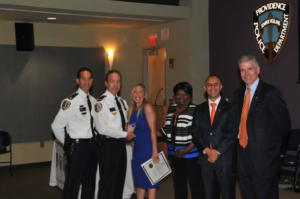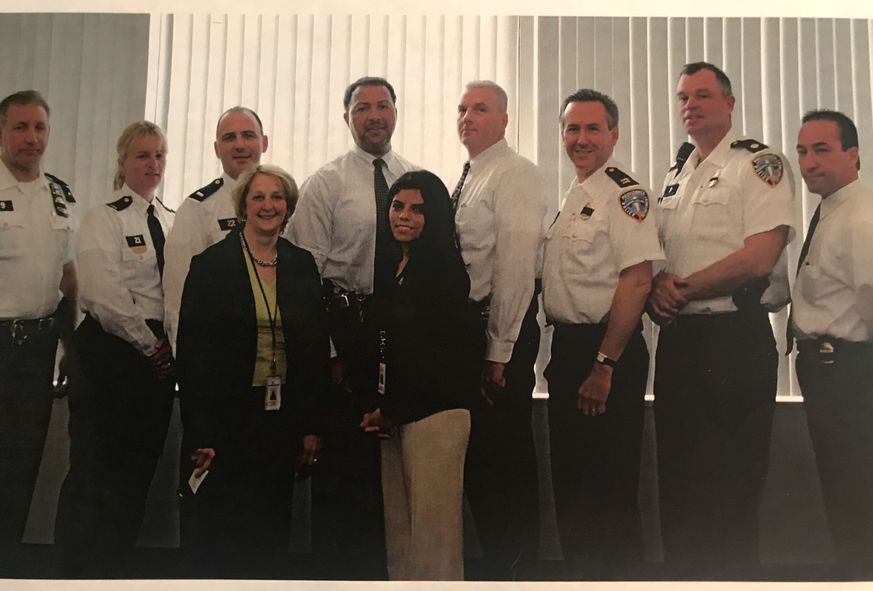Jessica Zira wakes up each day not knowing where she’ll go or who she’ll meet. But when she steps out the door each morning, she knows that whoever it is, it might just be the worst day of their lives.
She’s a member of Family Service of Rhode Island’s Go Team—a partnership between law enforcement and a group of trauma-informed clinicians that formed in 2004. Go Team members work alongside police to respond to calls in Central Falls, Providence, East Providence, and Pawtucket and serve as a victim’s advocate in emergency situations.
But even after 17 years of this partnership, the Go Team program’s important role and positive impact are still not widely known in Rhode Island. In a time when Americans are calling for more informed, proactive policing, programs like this are still rare nationwide.
“People learn about [the Go Team] and when they learn about it, they can’t believe it exists,” said Zira. “Whenever I have an incident, it’s always the first time I’ve had it. Nothing is ever the same. It keeps you on your feet for sure.”
Without the Go Team, police officers are faced with the work of balancing emotional trauma, mental trauma, physical abuse, immediate needs—all on top of their existing law-enforcement duties. Departments partnering with the Go Team program have had those challenges lifted, creating better outcomes for victims and establishing trusting bonds between clinicians and officers.
“Now they have an ally,” Zira said. “One of the things I say to victims when they’re so afraid of the offenders is that you have all the good guys on your side. It’s really amazing when the department starts to help, they bring everyone in. It’s like you have all these big brothers and big sisters.”
By showing up on the scene and giving immediate support, Zira is able to let law enforcement do what they need to do to stabilize the situation. This allows her to connect crime victims with important resources to meet their immediate and long-term needs resulting from their experience. This might include helping to find a new living situation, fulfill immediate food needs, connecting to local resources, and even help to navigate the legal system in the months ahead.
In 2019, Zira first got involved with Go Team through a former colleague who taught her everything she needed to know. Originally Zira worked closely with existing Go Team members to learn how the partnership worked and work with individuals receiving mental health services through the Providence Center. Many struggled with very complex mental health trauma including a history of abuse. After Zira learned more and built a working relationship with the team, Zira decided to join FSRI.

Much of Zira’s experience comes from her hard work at the Providence police station, FSRI, and in Central Falls. Working closely with police officers, Zira has extended knowledge of what police officers go through, and what a clinician goes through, making them both better able to support members of the community when they need it most.
Both clinicians and police officers come to the table with a certain expertise, and they grow to know the strengths of each and apply it to traumatic situations.
The partnership and bond that forms between police officers and clinicians is very special and is essential for providing better assistance for victims. As Go Team members enter physically and emotionally dangerous situations, trusting each other, working together, and being able to decompress afterward is key.
“You have to have a sense of humor when you’re doing this kind of work because it gets disturbing with what you see,” Zira said.
With recent funding hardships along with a current pandemic, the community has faced more troubled times than ever before. Cuts to the federal Victims of Crime Act funding (VOCA) last year cut federal funding nearly in half for the Go Team program. However, Go Team is still in motion, clinicians are still working effortlessly alongside police officers to change lives and support victims in need of support. FSRI continues to look for funding sources to make sure the program is sustainable now when it’s needed more than ever.
“You’re never really done working with them because maybe they’ll come to you in the future with another problem they need help with,” said Zira. “Our involvement doesn’t end. The initial point of contact is just where it begins.”
To learn about FSRI’s Go Team and how you can help, please visit familyserviceri.org.
